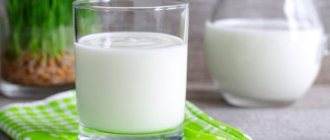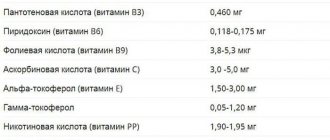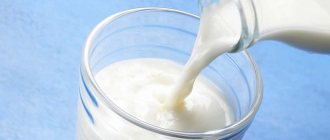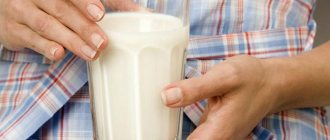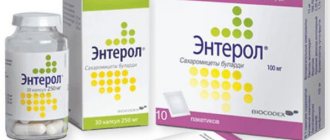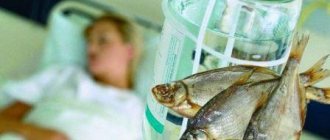Properties of kefir
In order to understand and evaluate the impact of this product on the human body, it is necessary to first understand its properties. Kefir is a fermented milk drink made from whole milk by fermentation, that is, the addition of bifidobacteria or fermented milk fungi. During the fermentation process, a tasty and healthy composition loved by many is formed, enriched with lactobacilli, vitamins, acids, proteins and fats.
Kefir is a natural prebiotic that improves the composition and quality of intestinal microflora. It prevents the emergence and development of pathogenic microorganisms and speeds up the digestion of food. In addition, numerous laboratory studies have proven that kefir strengthens the body’s immune system, has a mild laxative effect, and prevents the formation of constipation and intestinal disorders. That is why you should definitely include this drink in your diet.
When to get treatment
In case of complex severe intoxication, when signs of vomiting still make themselves felt, as a rule, the patient is recommended to drink more water and undergo therapeutic fasting. It is allowed to drink water, but to prevent the salt balance in the body from being lost, you can add Regidron. The next day, when the last vomiting has passed, taking into account the condition, you can start eating.
First and second day
During this period, you should only consume porridge cooked in water, chicken broth, and slightly sweetened tea (you can use simple crackers that do not contain nuts or poppy seeds). It is not recommended to consume kefir these days, there are two reasons for this:
- The first reason is the acidity of the drink, as a result of which it will be an irritant to the already inflamed gastric mucosa. As a result, the patient will experience a feeling of discomfort and may experience repeated vomiting.
- The second reason is the possible development of severe diarrhea, since kefir accelerates intestinal motility.
Third and subsequent days
After a short recovery on crackers and cereals, on the third day you can use low-fat kefir - one percent. However, after three or four days, when the patient’s body has stabilized, he will need to follow a strict diet. Kefir can also be included in it, as it will help replenish lost calcium and vitamins and help restore intestinal microflora. As a result of the antitoxic effect of the fermented milk product, a positive effect will be obtained and the recovery process will go faster. But kefir should be one day old, since it contains the least amount of alcohol and acidity.
During this period, due to the normalization of intestinal microflora, the use of fermented milk amino acids and enzymes will only be beneficial. As for alcohol intoxication, this fermented milk product is not prohibited; it is even recommended to drink it from the first days of feeling unwell. It will help overcome the consequences of alcohol poisoning by activating the processes of eliminating toxic substances.
As a result, we can state that the benefits of kefir in case of poisoning can be obtained if the deadlines are observed - that is, you start drinking it no earlier than on the third day, when the main signs of poisoning are left behind.
Kefir and poisoning
If acute symptoms of intoxication are detected, the doctor prescribes therapeutic fasting for at least a day. From the second day, provided there is no vomiting or diarrhea, you can drink strong black tea with crackers or bagels. After two days, it is allowed to supplement the diet with low-fat broth, for example from chicken or chicken. These are general recommendations from experts and do not contain fermented milk products. And all because at the slightest poisoning they are contraindicated. And there is a completely understandable scientific explanation for this.
Can I use kefir for poisoning? The answer in this case is obvious - no. And there are several reasons for this:
- Irritation - kefir in case of poisoning can only aggravate the patient’s condition and have a negative effect on the affected mucous membrane of the walls of the stomach and intestines. In rare and most advanced cases, hemorrhage is diagnosed.
- Acceleration of intestinal motility. It has been proven that kefir, when poisoned, can cause diarrhea, which will only worsen the situation.
Emergency help
A reasonable question, what to do, arises if you happen to be poisoned with kefir. Definitely, you need to call an ambulance, but you need to act before the doctors arrive.
Self help
Rinse the stomach with a solution of potassium permanganate
It is necessary to follow the standard algorithm of actions:
- Induce artificial vomiting. To do this, prepare a weak aqueous solution of potassium permanganate or table salt.
- Give a cleansing enema. To do this, you can use ordinary water or jelly water. It can be replaced with chamomile decoction (if you have it on hand).
- Drink any sorbent agent (activated carbon, polysorb, enterosgel, smecta).
- Drink in small portions (20 grams every 10-15 minutes). For drinking you can use still water, decoctions, compotes.
It is strictly not recommended to drink freshly squeezed concentrated juices or carbonated drinks.
There are still a few important points you need to know about.
You should not take medications whose action is aimed at stopping vomiting and diarrhea. You should not take antibiotics on your own, without the advice of a doctor.
Do not take antibiotics without a doctor's prescription
Treatment in hospital
The treatment protocol in the clinic is as follows:
- intravenous administration of glucose solution and saline;
- antibacterial therapy according to bacterial culture indications;
- forced diuresis;
- symptomatic therapy to improve the functioning of the cardiovascular system and central nervous system.
Rehabilitation therapy
Provided that the patient's physical condition is normal, a dietary diet is recommended . On the first day, it is recommended to refuse food and only drink plenty of fluids.
Gradually, baked apples, ripened bananas, biscuits, crackers and viscous porridges can be introduced into the diet. Then supplement the main diet with broths with chopped lean meat, vegetables and pasteurized low-fat dairy products.
To restore microflora, take probiotics.
Recovery
Is it possible to use kefir for poisoning? Can a fermented milk drink help during the recovery period? This time the answer is yes. We can talk about restoration of the body exactly when the main symptoms of intoxication disappear, that is, diarrhea, vomiting, nausea. As a rule, the patient notes an improvement in well-being and the appearance of appetite. And at this moment you can drink kefir. In case of poisoning, the normal functioning of the intestinal microflora is disrupted, and beneficial bacteria are almost completely destroyed. Kefir will have the most beneficial effect on the gastrointestinal tract, help restore its balance and completely get rid of the consequences of infection.
All amino acids, vitamins and microelements after poisoning have difficulty entering the blood through the damaged intestinal walls, the level of pathogenic microflora only increases, which increases the risk of exposure to other, more dangerous bacteria. Regular consumption of kefir in case of poisoning starts the process of renewal and restoration of microflora.
Treatment in a medical facility
Naturally, the likelihood of serious poisoning after a glass of kefir is very low, however, there have been situations when a person ended up in a hospital. The hospital has a special protocol that involves administering a glucose solution (with saline) in such cases. If the bacterial analysis gives positive results, then antibacterial agents are used for therapy.
In case of severe intoxication, the technique of forced diuresis is used, which accelerates the process of eliminating toxins. If necessary, symptomatic therapy is carried out.
Dosage
How much kefir can you drink if you have food poisoning in order to recover as quickly as possible? Usually - a glass twice a day (morning and evening) for a course lasting 14-16 days. In order to enhance the effect of a fermented milk product, it is often combined with prebiotics, for example, Bifidumbacterin or Lactobacterin. Regarding the medication used, it is better to consult with a supervising specialist who will help in this matter from a professional point of view, based on the individual characteristics of the patient. At this stage, again, under no circumstances should you self-medicate.
Alcohol poisoning
What to do in case of intoxication caused by food poisoning? In this case, the answer is obvious. But if suddenly you happen to be poisoned by alcoholic beverages, then kefir can not only be drunk from the first day, but it is also necessary. In this case, a fermented milk drink will help remove toxic substances from the body. Lactic acid has a beneficial effect on liver function, helping the body fight infection and recover faster. However, in the presence of vomiting and diarrhea, the daily norm of kefir is no more than 600 ml; at this stage you can replace it with mineral water or strong tea.
Prevention
In order not to spoil your health by consuming the product, you should be careful about the purchase and storage conditions:
- Late purchases are not permitted. Such a drink a priori does not have valuable qualities and leads to intoxication.
- Do not purchase if the packaging is damaged. In this case, both microorganisms present in kefir and those penetrating from outside can poison.
- You should not give your baby under one year old regular sour milk. It is necessary to consult with a pediatrician and opt for companies specializing in baby food, for example, Agusha.
- Store in the refrigerator, if not available, away from batteries.
Kefir is often prescribed as a restorative after intoxication. But it turns out that a healthy product can also poison. In this case, the ailment should be treated under the supervision of a doctor to reduce the risks of complications.
Daria Shirochina
Practitioner. She graduated with honors from Vitebsk State Medical University in 2012 with a degree in general medicine. She was awarded a certificate of honor for her achievements in her work.
Contraindications
It should be understood that a fermented milk drink such as kefir is not a medicine. In case of poisoning, you can drink it only after the main symptoms of acute infection have disappeared and only with the permission of the attending physician. Do not self-medicate under any circumstances, as this may aggravate the situation and lead to irreversible consequences. But there are contraindications that exclude the possibility of using kefir in case of poisoning:
- childhood - up to one year of age, it is strictly forbidden to give fermented milk products to a child due to the indigestibility and intolerance of casein protein;
- increased acidity of the stomach - gastritis, stomach ulcers are among the main contraindications;
- chronic diarrhea - due to the laxative effect of fermented milk product, people prone to diarrhea and intestinal disorders should not consume kefir. This will only worsen the diarrhea and ultimately lead to dehydration;
- allergies and individual intolerance to milk protein - such patients are strictly prohibited not only from consuming kefir, but also any other fermented milk products. This can cause irreversible consequences.
Causes of intoxication
It’s easy to get poisoned even from initially high-quality products if you don’t follow the precautions:
- Defeat is likely when kefir has stood in a warm place for several hours. This enhances fermentation processes, which leads to negative consequences.
- An expired product makes you feel sick. There is a kind of myth circulating among people that claims that the benefits of a stale drink are higher. But if the expiration date is not observed, it has time to turn sour, which leads to increased proliferation of streptococci and staphylococci, shigella.
- Another reason is the presence of preservatives and flavorings. Undoubtedly, such additives contribute to long-term implementation, but significantly reduce the benefits.
Kefir that is kept for no more than 10 days is considered valuable for health. It is optimal to consume the drink no later than 2 days from the date of release. If it is overdue, the risks of intoxication increase, which is especially difficult for children to tolerate. In a child under one year old, dehydration is likely, leading to death.
